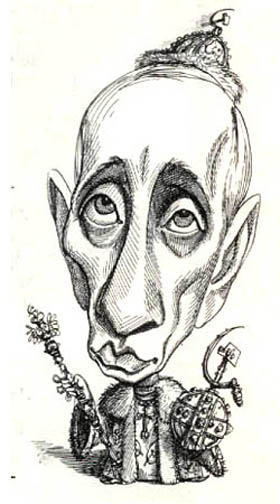 |
 |
HOT TOPICS: International affairs
Moscow's New Empire
Toby Westerman
Recent developments in Asia and Latin America have provided the Moscow elite with the ability to isolate the United States economically and threaten it militarily. Whatever setbacks Moscow may encounter in Ukraine will be dramatically offset by successes around the world.
From Asia to Latin America, Moscow is assembling a coalition of nations which possess much of the world's natural resources and has two-thirds of the world's population. Oil and weaponry form the basis of Moscow's economic and military appeal to a large portion of the planet. An increasingly virulent strain of anti-Americanism, fueled in part by Moscow, has also aided Russia's efforts.
For over a decade, Moscow has supplied Communist China with sophisticated arms and technological training. Many Peoples Liberation Army officers have attended Russian military academies. Russia has also agreed to extend oil pipelines to feed China's soaring economic growth - the same commercial muscle which pays for Russian military aid.
 |
Behind the new face of the Russian Communism, its imperialist aims remain unchanged. One of which is to assemble nations against the United States.
Cartoon from National Review, December 8, 2003
|
Russian diplomats are active not only in China, but also throughout Asia, and have found particular success in India. Moscow is using economic and military deals to foster a bond of friendship and growing cooperation with New Delhi.
In Latin America - the "backyard" of the U.S. - Moscow, along with its "strategic ally" China, is becoming increasingly powerful, especially in left-leaning Brazil, the largest nation in Latin America. Brazil is receiving assistance from both Russia and China in its attempt to develop a ballistic missile, and in its program to develop nuclear technology for civilian use. Many fear that atomic weapons will be produced along with electricity, and that Brazil's ballistic missile may someday carry those nuclear weapons.
Russian president Vladimir Putin has also recently concluded talks in Moscow with the Marxist ruler of Venezuela, Hugo Chavez.
In addition to an exhibition of relaxed, humorous banter between the two leaders, Putin and Chavez agreed "to promote the development of cooperation in the sphere of military technology," according to the Russian news daily, Izvestia. On Chavez's current wish list are "large amounts" of anti-aircraft systems, anti-tank weaponry, helicopters, and 100,000 assault rifles.
The weapons are "not intended to encroach upon any nation," but are "directed against any aggressor," Chavez stated.
Some observers question if some of the weaponry may end up in the possession of Communist guerrillas operating in neighboring Colombia. Chavez reportedly assists the Colombian Marxists, although he denies any connection with the rebels.
One of Colombia's Communist guerrilla armies, the Revolutionary Armed Forces of Colombia (FARC), reportedly sought to kill U.S. President George Bush during his visit to the South American nation.
Putin and Chavez, who respectively lead the second and sixth largest oil producing nations, agreed to "stabilize" the world price of oil. The impact upon the U.S. from the agreement between Putin, the "ex-" KGB officer, and the avowedly Marxist Chavez remains to be seen.
Communist Cuba, once thought by most political analysts to have been abandoned by Moscow, enjoys Moscow's full and enthusiastic support. In a meeting with Cuban Foreign Minister Felipe Perez Roque, Russian Foreign Minister Sergei Lavrov declared Cuba to be a "key country in Latin America" for Russia. The "new" Russia and the Communist dictatorship have a "profound mutual attraction based on decades of friendship," stated Lavrov, according to the Voice of Russia World Service.
Moscow's assessment of Cuba's importance in Latin America is essentially correct, and is verified by the high esteem in which Cuban dictator Fidel Castro is held in much of Latin America. From the presidential administrations in Brazil and Argentina to the guerrilla fighters in Colombia, Castro and his government have the highest respect of the increasingly powerful Latin American left.
Castro is the role model for Chavez, and the two Marxist leaders have developed a deep personal friendship. Castro's goal for his nation and his allies has not changed, of course. It remains the destruction of all capitalist governments, including that of the United States.
The skilled use of oil and arms diplomacy has constructed a global sphere of influence and leadership for Moscow, far surpassing anything which could have been accomplished in the Soviet era. Putin and the Moscow elite have assembled a group of nations which, taken together, own much of the world's resources and have nearly two-thirds of the world's population. Among these are also supporters of terror, including Iran and old Soviet allies, North Korea, and Syria.
In its conduct of international affairs, in the de facto if not stated attempt to isolate the United States, Putin's "new" Russia bears an increasing resemblance to the old Soviet Union.
Toby Westerman writes and edits
International News Analysis - Today
An investigative, analytical, and uncompromising weekly analysis of the world situation
Contact T. Westerman at www.inatoday.com
or P.O. BOX 5182, Rockford, ILL, 61125-0182
Moscow's New Empire was published in the December 1, 2004 online edition of INA Today
|
International Affairs | Hot Topics | Home
Books | Tapes | Search | Contact Us

©2002-2014 Tradition In Action, Inc. All Rights Reserved
|
 |
|